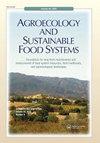扩大大城市地区粮食系统转型的农业生态学:与德国柏林粮食中心相连的社区支持农业农场的农业生态学特征和知识作用
IF 2.6
3区 农林科学
Q1 AGRICULTURE, MULTIDISCIPLINARY
引用次数: 2
摘要
我们调查了柏林市一个现有的农业食品网络,该网络连接了10个区域社区支持的农场和一个食品中心。该研究的总体目标是通过使用农业生态学标准工具,重点关注知识(共同)创造和共享的作用,对农场进行农业生态学表征。我们对10位农民进行了步行访谈,并应用了参与式研究技术。我们发现,首先,农民要么已经将农场转变为先进的农业生态模式(3级),要么正在从有机农业向生态农业过渡(2-3级)。其次,农场和区域农业食品系统参与者之间的互动促进了食客和区域种植者之间的重新联系(第4级)。因此,这种转变的参与者属于基层自组织和基于团结的倡议,这些倡议建立了一个基于农业生态的区域农业食品网络。第三,为吸引广泛的利益相关者而确定的活动和形式的多样性为重新定义权力关系和共同创造知识提供了资源。然而,要扩大这一网络,必须解决一些重要的障碍,例如缺乏促进知识(共同)创造和共享的结构、平台和合作,获得负担得起的安全土地,以及缺乏政府支持。图形抽象本文章由计算机程序翻译,如有差异,请以英文原文为准。
Scaling agroecology for food system transformation in metropolitan areas: Agroecological characterization and role of knowledge in community-supported agriculture farms connected to a food hub in Berlin, Germany
ABSTRACT We investigated an already existing agri-food network connecting ten regional community-supported agriculture farms with a food hub in the city of Berlin. The overall aim of the study was to conduct an agroecological characterization of the farms by using the Agroecology Criteria Tool and focusing on the role of knowledge (co-)creation and sharing. We conducted walking interviews with ten farmers and applied participatory research techniques. We found that, first, the farmers either have already transformed the farm into an advanced agroecological model (level 3) or are transitioning from organic to agroecological (level 2–3). Second, the interactions between the farms and regional agri-food system actors foster the reconnection between eaters and regional growers (level 4). The actors of this transformation belong, thus, to grassroots self-organized and solidarity-based initiatives, which have built an agroecology-based regional agri-food network. And third, the diversity of activities and formats identified for engaging a broad range of stakeholders provides resources for redefining power relationships and co-creating knowledge. However, there are important barriers that must be addressed to scale this network, such as the lack of structures, platforms and collaborations fostering the knowledge (co-)creation and sharing, access to affordable and secure land, and the lack of governmental support. GRAPHICAL ABSTRACT
求助全文
通过发布文献求助,成功后即可免费获取论文全文。
去求助
来源期刊

Agroecology and Sustainable Food Systems
AGRICULTURE, MULTIDISCIPLINARY-GREEN & SUSTAINABLE SCIENCE & TECHNOLOGY
CiteScore
4.80
自引率
7.70%
发文量
73
期刊介绍:
Agroecology and Sustainable Food Systems is devoted to the rapidly emerging fields of agroecology and food system sustainability. By linking scientific inquiry and productive practice with transformative social action, agroecology provides a foundation for developing the alternative food systems of the future. The journal focuses on the changes that need to occur in the design and management of our food systems in order to balance natural resource use and environmental protection with the needs of production, economic viability, food security, and the social well-being of all people.
Agroecology and Sustainable Food Systems examines our current food systems from production to consumption, and the urgent need to transition to long-term sustainability. The journal promotes the study and application of agroecology for developing alternatives to the complex problems of resource depletion, environmental degradation, a narrowing of agrobiodiversity, continued world hunger, consolidation and industrialization of the food system, climate change, and the loss of farm land. The journal uses a food systems approach, and seeks experiences in agroecology that are on-farm, participatory, change-oriented, and backed by broad-based methodologies of sustainability analysis and evaluation.
 求助内容:
求助内容: 应助结果提醒方式:
应助结果提醒方式:


